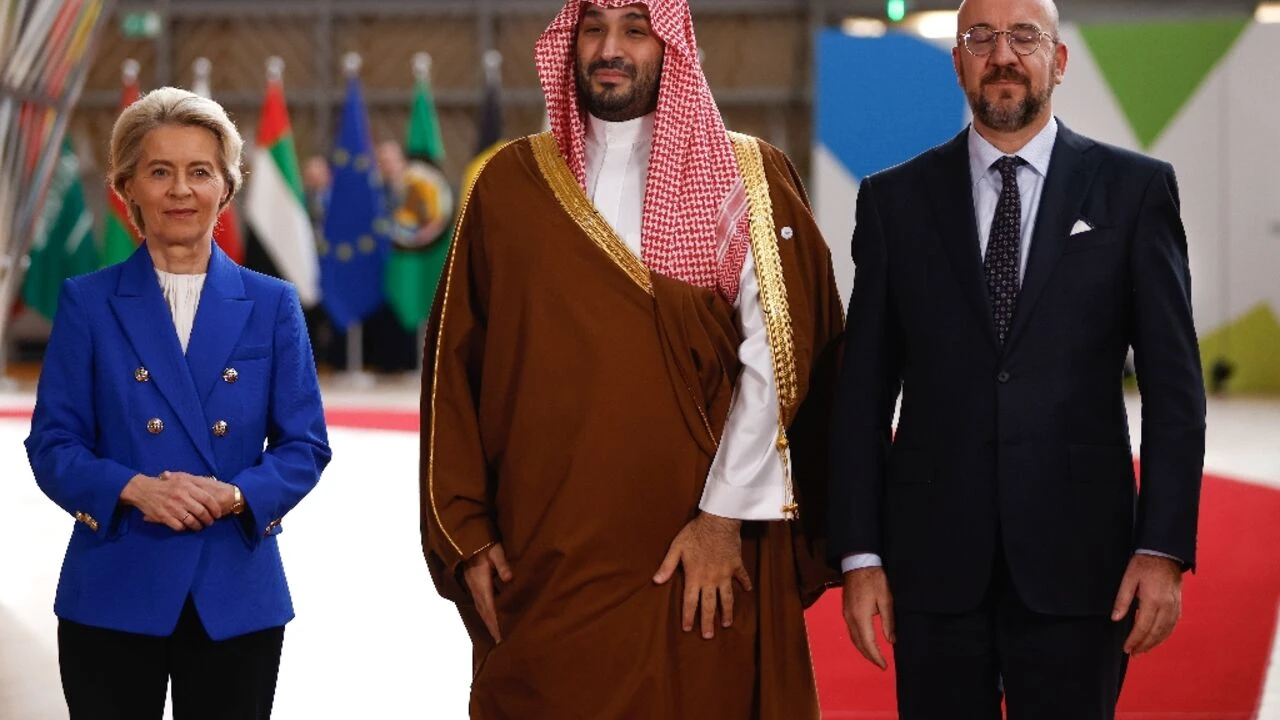Middle East crisis top-of-mind at first EU-Gulf summit

Stay tuned with 24 News HD Android App

Gulf leaders including Saudi Crown Prince Mohammed bin Salman met with European heads of state and government in Brussels Wednesday for summit talks the EU hopes could help defuse an "extremely dangerous escalation" in the Middle East.
The 27-nation European Union is seeking to work more closely with the Gulf Cooperation Council (GCC) -- which brings together Bahrain, Kuwait, Oman, Qatar, Saudi Arabia and the United Arab Emirates -- in addressing conflicts in both the Middle East and Ukraine.
"Russia's war against Ukraine and the Hamas-led terrorist attack against Israel on October 7 have fundamentally undermined regional security in Europe and the Gulf," EU chief Ursula von der Leyen told the gathering in opening remarks.
"We need to do all in our power and mobilize all our diplomatic skills to stop the extremely dangerous escalation with now Iran launching a massive ballistic attack against Israel, or Huthis attacking our ships," she added, calling for an immediate ceasefire in Gaza and Lebanon.
The first-ever gathering of its kind, the EU-GCC summit comes on the eve of an EU leaders' meeting in the Belgian capital.
Confirmed at the last minute, the presence of Saudi Arabia's de facto ruler among the six Gulf leaders in attendance heightened expectations.
Trade, energy and climate change were all on the table, but Israel's conflicts in Gaza and Lebanon -- on which the two groups hold broadly converging views -- were set to dominate the agenda.
"We need a settlement for these conflicts," said Qatar's emir, Sheikh Tamim bin Hamad Al-Thani.
"We hope that this first summit will be the first step to consolidate our historic ties between the GCC and the EU."
- 'Unprecedented opportunity' -
The EU is the second-largest trading partner for GCC countries but talks on a trade pact have languished for years.
While views differ on Russia's invasion of Ukraine -- in particular the implementation of Western sanctions and the EU's push to punish Iran for bolstering Moscow's war effort -- there was some hope of closer cooperation on that front.
"I'm confident that we can work together and rely on you to stop this illegal Russian war," von der Leyen told Gulf leaders.
The Brussels summit comes just over a year into the war between Israel and Iran-allied Palestinian militant group Hamas that has in recent weeks expanded to include Lebanon -- raising fears of a major regional conflict.
Traditionally Western allies, the resource-rich Gulf monarchies have grown closer to Iran, which backs Hamas in Gaza and Hezbollah in Lebanon.
They have repeatedly called for the creation of a Palestinian state alongside Israel, with some playing a key role in efforts to secure a ceasefire in Gaza.
Hezbollah had been exchanging cross-border fire with Israel for almost a year, saying it is acting in response to Israel's devastating ground and air assault on Gaza.
The war in Gaza began after the armed wing of the Palestinian militant group Hamas launched a surprise attack from the territory into Israel on October 7, 2023.
The near-daily exchange of fire across the Israel-Lebanon border led to the displacement of tens of thousands of people on both sides even before last month's escalation -- with at least 690,000 people now displaced.
Chaired jointly by European Council president Charles Michel and Qatar's Sheikh Tamim, who currently holds the rotating GCC presidency, the EU-GCC meeting presented "an unprecedented opportunity to discuss issues of mutual interest," said Saudi Arabia's Prince Mohammed.
His red carpet welcome in Brussels however sparked criticism over Riyadh's poor human rights record.
"European leaders smiling and shaking hands with a man allegedly responsible for having a journalist dismembered is deeply disturbing," said EU lawmaker Daniel Freund, of the Greens.
Prince Mohammed, who has pushed to soften Saudi Arabia's ultra-conservative image and open up the country to tourists and investors, was linked by US intelligence to the brutal killing of Saudi critic Jamal Khashoggi in 2018.
Human Rights Watch called for EU leaders to press their Gulf counterparts for reforms -- including on the jailing of political prisoners, freedom of expression, labour and women's rights.
"EU leaders should make it clear that the release of critics and progress on human rights are vital for bilateral relations," said Claudio Francavilla, the group's associate EU director.
The published agenda for the talks made no mention of human rights.
